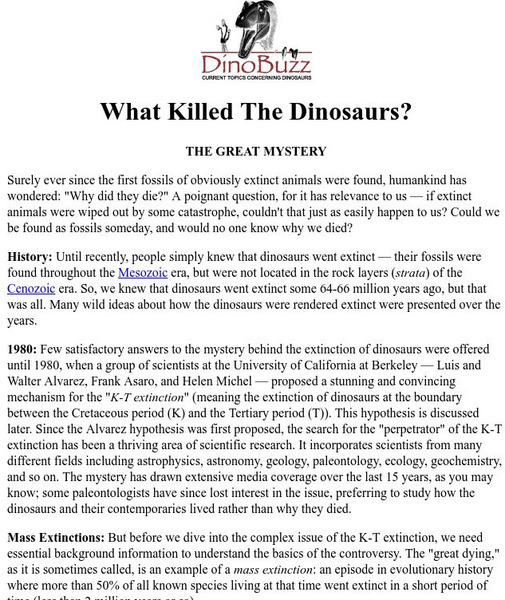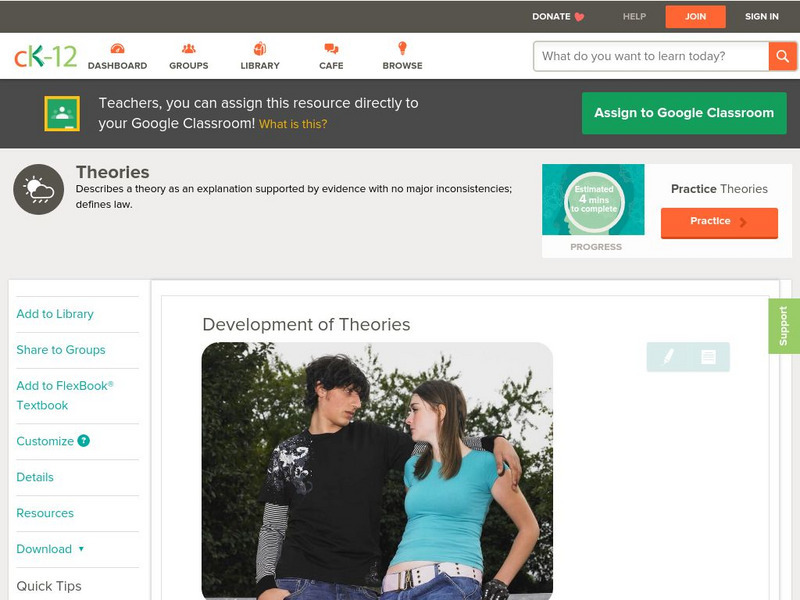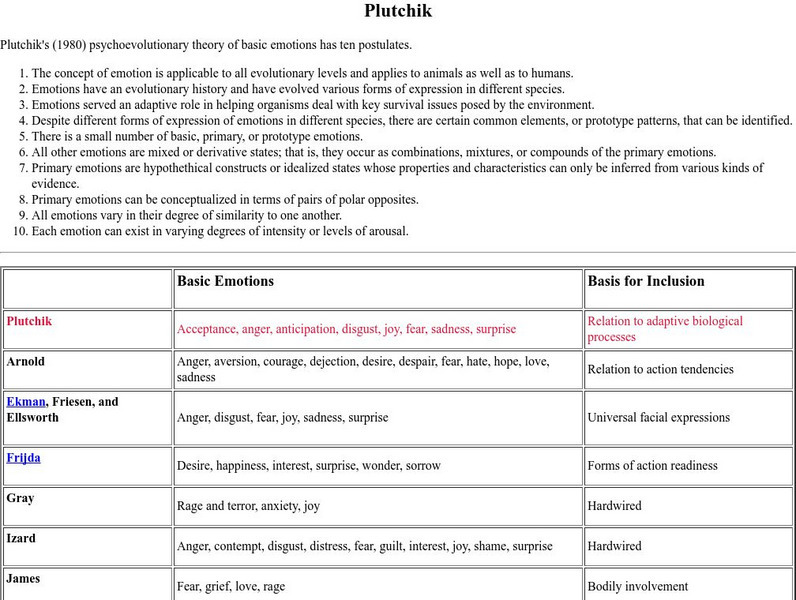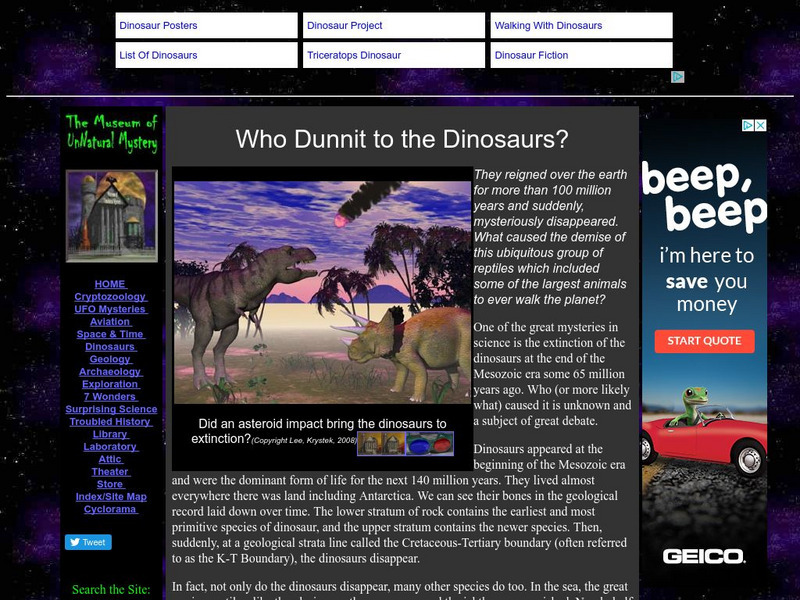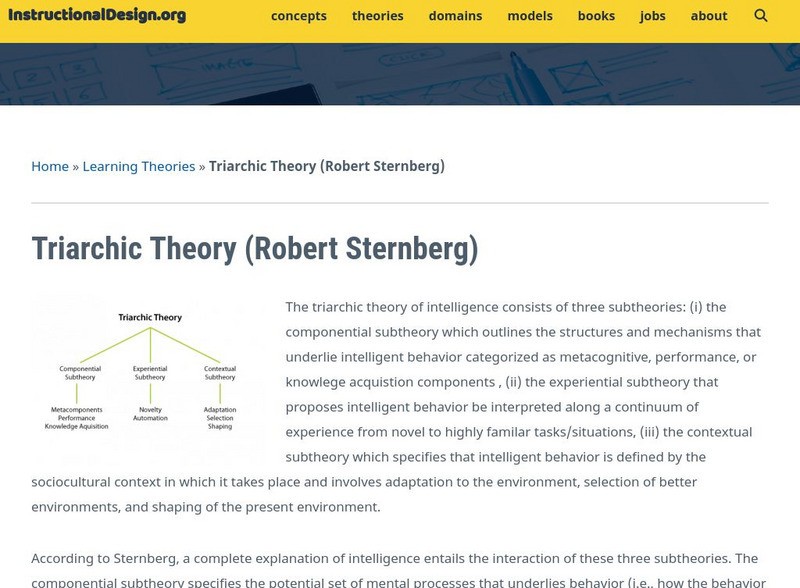Curated OER
Discovering Dinosaurs
Students discuss that scientists have theories about what dinosaurs were like but are unsure because they are no longer living. In this dinosaur research instructional activity, students examine how scientists use evidence to determine...
Curated OER
Erikson and Disabilities
High schoolers are introduced to a variety of educational theories related to disabilities. After watching a PowerPoint presentation, review the various types of disabilities and how the theories relate to Erikson's ideas. To end the...
Curated OER
Famous People: Albert Einstein
Students research Albert Einstein and the two parts of the Relativity Theory.
Curated OER
Wild Kingdom
Students research and discuss the natural habitats and various evolutionary theories of giraffes and other animals imported into ancient Rome.
Curated OER
Scientific Theories
Ninth graders compare and contrast how different models can be used to represent scientific understandings. They evaluate the use of data when considering scientific claims. Students debate a variety of socio-scientific issues and the...
University of California
Ucmp: What Killed the Dinosaurs?
This UC Berkeley site extensively covers the death of the dinosaurs. It includes history, theories, invalid hypotheses, and current arguments.
California State University
California State Univ.: Happiness, Hope, and Optimism
California State University offers this student research paper that explains the emotions of hope, happiness, and optimism. Shows how these emotions are similiar and different and how biology affects feelings.
Symmetry Magazine
Symmetry Magazine: Explain It in 60 Seconds: A Theory
The definition of a theory as it applied to science is explained in this brief article. "Explain It In 60 Seconds" is an article series that aims to summarize in a few paragraphs the meaning of different concepts in particle physics.
SEDL
Sedl: Extinction
This second lesson in a course on dinosaurs is devoted to extinction. There are group activities, discussion of the idea, and a way to assess what the students have learned.
Other
College of the Holy Cross: The Logic of Scientific Reasoning [Pdf]
Explore the idea of the logic of scientific reasoning with this discussion of how science, thinking, and reasoning relate to one another.
Houghton Mifflin Harcourt
Houghton Mifflin Harcourt: Cliffs Notes: Perspectives on Abnormal Behavior
An overview of the different models for interpreting and treating abnormal behaviors.
Biz Move
Bizmove.com: Business Customer Relationship Management
Comprehensive overview from bizmove.com focuses on understanding who your customer is, motivation behind purchase, when purchase takes place, and understanding that what they "buy" is not necessarily what they want. Good presentation....
CK-12 Foundation
Ck 12: Earth Science: Development of Theories
[Free Registration/Login may be required to access all resource tools.] Examines theories and laws in science.
CK-12 Foundation
Ck 12: Earth Science: Development of Theories
[Free Registration/Login may be required to access all resource tools.] Examines theories and laws in science.
Other
New World Encyclopedia: Abnormal Psychology
Explains what the field of abnormal psychology covers, its historical roots, the different models used in the study of mental illness, the Diagnostic and Statistical Manual of Mental Disorders (DSM) used in diagnosis, and the...
Other
E Learn Portal: Origins of Treatment and Defining Abnormal Behavior Continued
Provides an overview of the various theories of how to explain abnormal behaviors.
Khan Academy
Khan Academy: Theories of Personality Questions
This is a 10-question quiz pertaining to Theories of Personality. Prep for the MCAT test.
Other
Personality Research: Plutchik
This site lists Plutchik's ten postulates for psychoevolutionary theory on emotions, and provides basic emotions and a basis for inclusion for each. Also includes a bibliography.
Other
Who Dunnit to the Dinosaurs?
"One of the great mysteries in science is the extinction of the dinosaurs at the end of the Mesozoic Era some 65 million years ago. Who (or more likely what) caused it is unknown and a subject of great debate." Many theories are touched...
Other
Dinosaur Extinction: One More Hypothesis
"The survivals and extinctions at the close of the Cretaceous are such as might be expected to result from intensely hot winds such as would be generated by extra large meteoritic impacts." This article suggests that this theory should...
CK-12 Foundation
Ck 12: Plix: Example for Development of Theories
[Free Registration/Login Required] An exercise where students must distinguish between laws and theories, then answer a challenge question.
Other
Gwu: Triarchic Theory (R. Sternberg)
This resource presents an overview of Sternberg's Triarchic Theory of intelligence, using academic vocabulary. It includes a chart & references.
Harvard University
Web Science Resources: A Brief History of Optics
This timeline compiles an enormous amount of historical information from the field of optics. From 300 BCE to the present, strategic experiments, findings, and theories are described.
University of St. Andrews (UK)
University of St. Andrews: Augustin Fresnel
A short biographical sketch on the life and work of Augustin Fresnel (1788-1827). Comments on a few of his scientific accomplishments.







